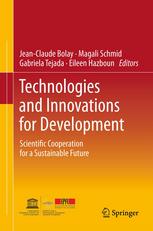

Most ebook files are in PDF format, so you can easily read them using various software such as Foxit Reader or directly on the Google Chrome browser.
Some ebook files are released by publishers in other formats such as .awz, .mobi, .epub, .fb2, etc. You may need to install specific software to read these formats on mobile/PC, such as Calibre.
Please read the tutorial at this link: https://ebookbell.com/faq
We offer FREE conversion to the popular formats you request; however, this may take some time. Therefore, right after payment, please email us, and we will try to provide the service as quickly as possible.
For some exceptional file formats or broken links (if any), please refrain from opening any disputes. Instead, email us first, and we will try to assist within a maximum of 6 hours.
EbookBell Team

0.0
0 reviewsTechnological innovation – combined with scientific research – has always constituted a driving force of transformation in our societies. At the same time, it is no longer simply possible to transfer technologies from the North to the South; it is also essential to consider technical innovations that are adapted to the social, environmental, cultural and economic conditions of receiving countries, and which can be appropriated by their potential users and as such prove to be real technologies for fostering development.
The first International Scientific Conference on the topic organized by the UNESCO Chair Technologies for Development at the Ecole Polytechnique Fédérale de Lausanne in 2010 focused on its four priority sectors: Technologies for Sustainable Development of Habitat and Cities, ICTs for the Environment, Science and Technology for Disaster Risk Reduction, and Technologies for the Production of Sustainable Energy.
This volume reflects the main outcomes of the conference and provides some significant orientation and success criteria for the effective implementation and use of innovative technologies, their aims, their particular applications in the context of developing countries, their accessibility for users, and their appropriation by producers and stakeholders in the field of development both in the North and South, thus ensuring their sustainability. This kind of scientific cooperation also highlights the added values for northern researchers in sharing their knowledge and know-how, leading to a real win-win partnership.
The authors gathered within this book include representatives from academic and research institutions and other organizations from diverse countries and offer a significant synergy of competences, approaches and disciplines.